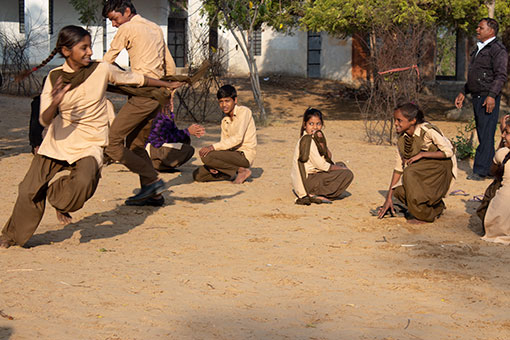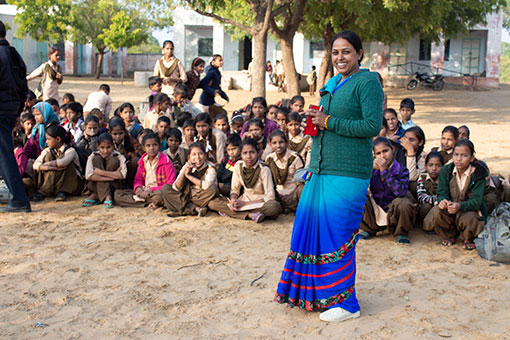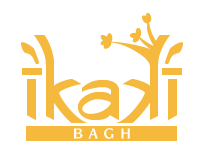

Key points
- A key part of the Ikaki Bagh organic farm model is a working, sustainable relationship with the local school and village
- The local school is the ‘Government Upper Primary Middle School, Jhinjha’. Its development is essential to the socio-economic advancement of the community
- India’s education system is the largest in the world
Over 200 million children in India receive their education from Government Schools. Government Schools are critically important in rural India. Most of the population are unable to afford private school education.
More than 95 percent of India’s children attend primary school, less than half of 16-year old’s (just 44 percent) complete Class 10. This is a huge challenge for India, especially rural India. The country will soon have the largest and youngest workforce the world has ever seen.
Many of the children at the Government Upper Primary Middle School, Jhinjha, are the first in their family to go to school or are going further in school than anyone in their family ever have.
Parents of these children understand the importance of education. Good education has the power to break the chains of deeply entrenched, widespread social disadvantage. However, the support these parents can provide is very limited.
Without targeted and better resourced support, the children face risks of falling behind in school and dropping out.
The children of the Government Upper Primary Middle School, Jhinjha
The school was established in 1986. Today, 260 children attend the school aged between 6 and 14 years old. They come from the local Jhinjha Village and the surrounding area. There is almost a 50/50 split between boys and girls, above the average for Indian rural schools. The girls are especially enthusiastic students.
The children:
- Attend school 6 days per week
- Focus on science, maths, Hindi, and basic English and sit exams
- Have an obvious passion for learning
- Receive basic school uniforms and an annual school book by the Government. Girls are given basic sanitary products
- Receive a lunchtime meal as part of the national Midday Meal Scheme funded by the Indian Government. Most children go to school in the morning with only a glass of milk
- All children walk to school in all weather conditions
- Are at risk of undernutrition that prevents them from developing properly. This condition is known as ‘stunting’
Families are paid a small amount of money each year upon their children completing attendance at school. The fee is slightly larger for girls as a mechanism to encourage school retention.
The children have none of the equipment and facilities common in developed countries. They do have a great sense of play and skills to make simple items such as kites from waste materials.
Parents put a lot of emphasis on a good appearance of their children at school.
The School
The school is:
- Staffed by a Principal and five teachers, all trained to teach a variety of subjects. Teachers are often rotated to a different school every few years.
- The current Principal has been at the School for over four years
- A construction of brick and concrete classrooms that hold up to 40 students each
- Without technology, computers or teaching tools including a library
- Without heating
- Without tables of chairs
- Uses squat latrines flowing in to the adjoining field
- Supplied with two taps providing access to water for drinking, cleaning dishes and washing hands
- Planted with trees in the playground area to provide some protection in Summer
Mid Day Meal Scheme
In 1995, the Indian Government launched a school meal program, known as the Midday Meal Scheme. The scheme is designed to enhance enrolment, retention of children and to improve nutritional levels among children.
The program is free. It sets a benchmark to feed primary school age children 450 calories and 12 grams of protein. Upper primary school children are to receive 700 calories and 20 grams of protein per day.
Food typically provided is a mix of pulses, vegetables and condiments. The Government funding covers these costs. Funding also covers fuel and wages payable to personnel hired by the school.
At the Government Upper Primary Middle School, Jhinjha, the Mid Day meal varies between pulses and vegetables with a chapati (unleavened flatbread). The meals are prepared by local women using a rudimentary kitchen. Meeting the calories and protein benchmarks is challenging.
School children are served lunch on a small plate which they are then responsible for washing and returning to storage racks.
Ikaki Bagh Support
Ikaki Bagh is playing a growing role supporting the school and the children including:
- Working directly with the Principal to identify areas of practical assistance, including ethical engagement and a sustainable, positive working partnership model
- Hosting international fee-paying visitors interested in experiencing Indian rural daily life including visiting the school
- Hosting volunteers interested in short, intensive project work at the school
- Fund-raising
- Supporting the development of school infrastructure
- Advocacy on behalf of the school
To date, Ikaki Bagh has:
- Hosted numerous visits by overseas visitors over the last five years. Some visitors have donated money for school equipment and supplies.
- Negotiated for a percentage of visitors’ fees to go to the nearby Jhinjha Village.
- Hosted a visit by a group from Color My World, a US-based non-profit organisation http://colormyworldkids.org/. The group visited in June, 2018. They repainted the entire school and completed water harvesting infrastructure work
- Supported a tree planting program at the school by a group of visitors
- Funded a second water fountain for the school
- Given sweaters to school children to mitigate the effects of Winter
- Facilitated closer engagement between senior local politicians, the school and the Ikaki Bagh project
- Initiated monthly meetings with senior people from the local village. These meetings discuss priorities for engagement, including support for the school
- Engaged local and international specialists to support the development of Ikaki Bagh including the school
As the first organic farm in the area, Ikaki Bagh is setting an example of better economic and environmental practices.
Many of the local children help their parents with their farm work and in local village vegetable gardens. Over time, it is hoped some of the school children will learn about organic farming and how to apply it to their own families’ farming.
Further Support
Ikaki Bagh welcomes interest in support for our local school. We are conscious of not creating heavy reliance on donor funding. At the same time, improved health, school conditions and infrastructure facilities will lead to better educational outcomes.
Support would be welcomed for:
- Winter clothing
- Extra nutrition
- Tables and chairs
- Sewing kits
- Carpets
- A bio-toilet facility
- Development of a virtual and physical library
- Improved water supplies
- An all-weather protection shed for the schoolyard
- Tree planting
- Micro-economic opportunity development for the older children in conjunction with their parents
